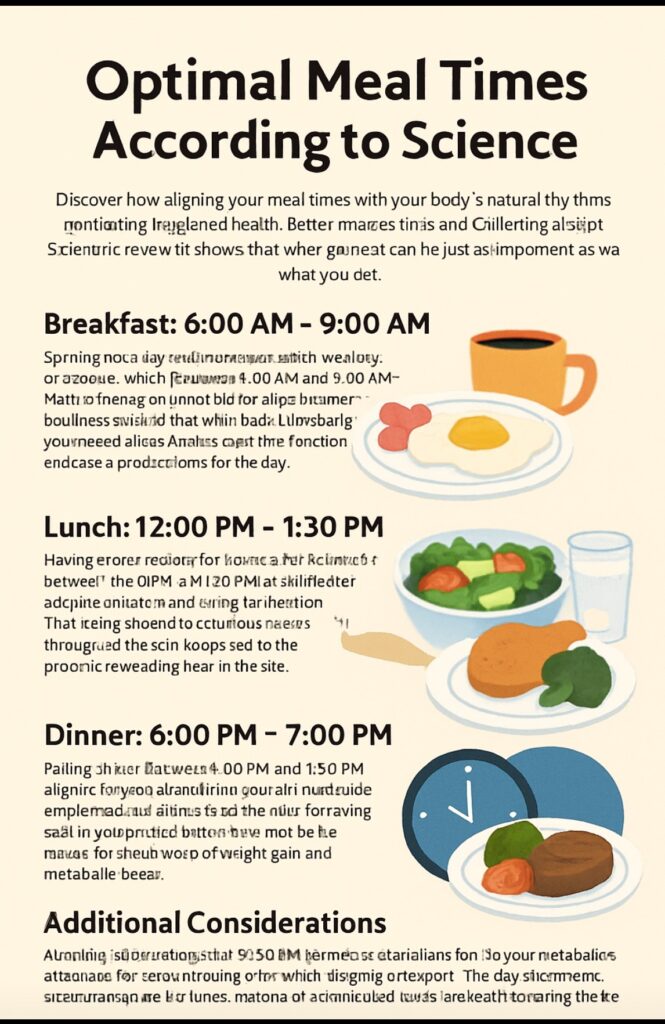When it comes to nutrition, most people focus on what they eat. However, a growing body of research in chrononutrition—the science of how eating patterns relate to circadian rhythms—suggests that when you eat may be just as important as what you eat. Aligning meal times with your body’s internal clock can improve metabolic health, support weight management, enhance cognitive function, and improve sleep. This article explores the scientifically recommended times for breakfast, lunch, and dinner, and explains the rationale behind these guidelines.
Breakfast: 6:00 AM – 9:00 AM
Breakfast is often dubbed “the most important meal of the day,” and science offers several reasons to support this claim. Your body’s circadian rhythm—which governs physiological processes including hormone secretion and digestion—reaches a peak in insulin sensitivity in the early morning. Insulin is a hormone that allows cells to absorb glucose from food, and higher sensitivity means your body is more efficient at processing carbohydrates early in the day.
Eating breakfast between 6:00 AM and 9:00 AM helps regulate blood sugar levels and jumpstarts your metabolism. Studies have shown that people who eat breakfast within one hour of waking experience better glycemic control, reduced hunger hormones such as ghrelin, and improved mental alertness. Skipping breakfast or delaying it can disrupt glucose metabolism and increase the risk of obesity and type 2 diabetes.
Furthermore, the brain relies heavily on glucose for energy. A balanced breakfast rich in complex carbohydrates, proteins, and healthy fats has been associated with enhanced cognitive function, better mood, and improved memory, particularly in children and adolescents.
Lunch: 12:00 PM – 1:30 PM
Lunch should ideally be consumed about four to five hours after breakfast, placing it between 12:00 PM and 1:30 PM for most people. At this time, the digestive system is still functioning efficiently, and the body is well-equipped to handle a substantial meal. Research shows that our ability to digest and metabolize food declines as the day progresses, so consuming the largest meal of the day in the early afternoon can have metabolic benefits.
One study published in the journal Obesity found that individuals who consumed a greater proportion of their daily calories at lunch, rather than dinner, experienced more significant weight loss and improved insulin sensitivity. This supports the idea that mid-day is the optimal time to consume more calories, especially if the meal is balanced with fiber-rich vegetables, lean proteins, and healthy fats.
Lunch also serves a critical role in maintaining energy levels and preventing mid-afternoon fatigue. A well-timed, nutritious lunch can sustain mental focus and physical performance throughout the remainder of the day. Skipping lunch or consuming it too late may lead to energy crashes and increased cravings for sugary or processed snacks later in the day.
Dinner: 6:00 PM – 7:00 PM
Dinner timing is especially crucial when it comes to metabolic health and sleep quality. The body’s ability to process glucose declines in the evening, and late-night eating has been linked to weight gain, impaired glucose tolerance, and disrupted sleep cycles. Eating between 6:00 PM and 7:00 PM allows the body adequate time—typically 2 to 3 hours—to digest the meal before sleep.
Circadian biology research has shown that eating close to bedtime can interfere with the secretion of melatonin, the hormone that regulates sleep. Additionally, nighttime eating has been associated with increased risk of cardiovascular disease and metabolic syndrome. One study in the Journal of Clinical Endocrinology & Metabolism found that late dinners can result in higher blood sugar and lower fat oxidation throughout the night, increasing the risk of fat storage.
By having dinner earlier in the evening, you align your food intake with your body’s natural rhythms, which helps regulate appetite hormones, improve digestion, and support restful sleep. A lighter dinner that includes proteins, vegetables, and minimal refined carbohydrates is ideal for promoting satiety without burdening the digestive system overnight.
Scientific Basis: Circadian Rhythms and Chrononutrition
Our biological clock is regulated by the suprachiasmatic nucleus (SCN) in the brain, which responds to light and dark cycles. However, peripheral clocks in organs like the liver, pancreas, and intestines are also influenced by food intake. When meal timing is synchronized with these rhythms, the body functions more efficiently.
Chrononutrition, a growing field of study, explores how meal timing affects health. Research has shown that irregular eating patterns, such as shift work or frequent late-night snacking, can disrupt circadian rhythms and increase the risk of obesity, insulin resistance, and inflammation. Regular, timely meals support hormonal balance, optimize nutrient metabolism, and enhance the gut microbiome.
A landmark study in Cell Metabolism showed that individuals who practiced time-restricted eating—eating all meals within a 10- to 12-hour daytime window—had improved metabolic markers, reduced body fat, and better sleep quality compared to those who ate over a 15-hour period. These findings suggest that even without changing the type or amount of food, simply aligning meals with circadian rhythms can yield significant health benefits.
Additional Considerations
While these general guidelines apply to most people, individual factors such as chronotype (morning person vs. night owl), work schedule, exercise routine, and health conditions may affect the ideal timing of meals. For example, athletes may require nutrient timing around workouts, and individuals with diabetes should consult with healthcare providers about glucose management.
In any case, avoiding erratic meal times and eating late at night (after 9:00 PM) can help maintain metabolic balance. Consistency in meal timing is associated with better appetite regulation, improved energy levels, and reduced risk of chronic diseases.
If you are considering adopting intermittent fasting, Mediterranean-style meal timing, or any specialized dietary pattern, these should ideally still respect the principles of circadian biology. The key takeaway: your body is not only what you eat—it’s when you eat, too.

